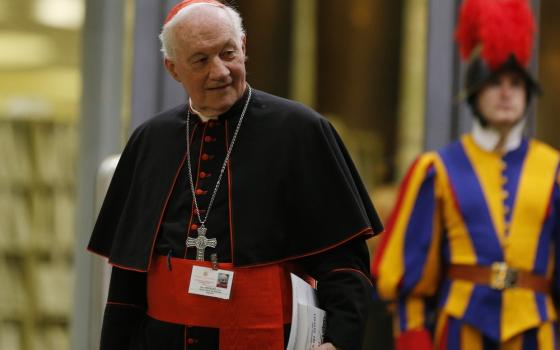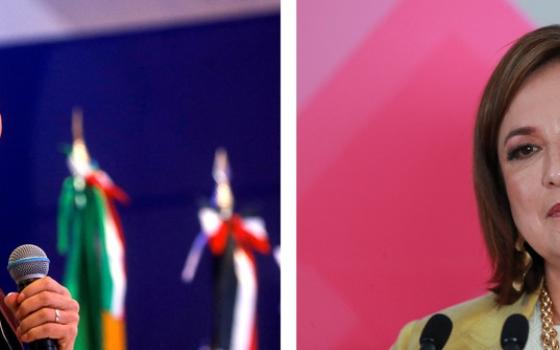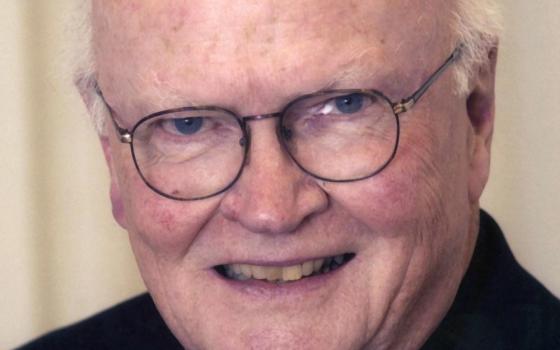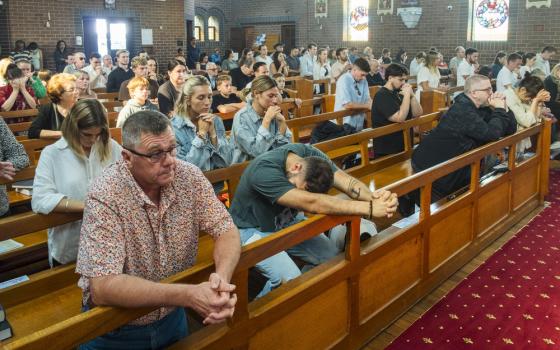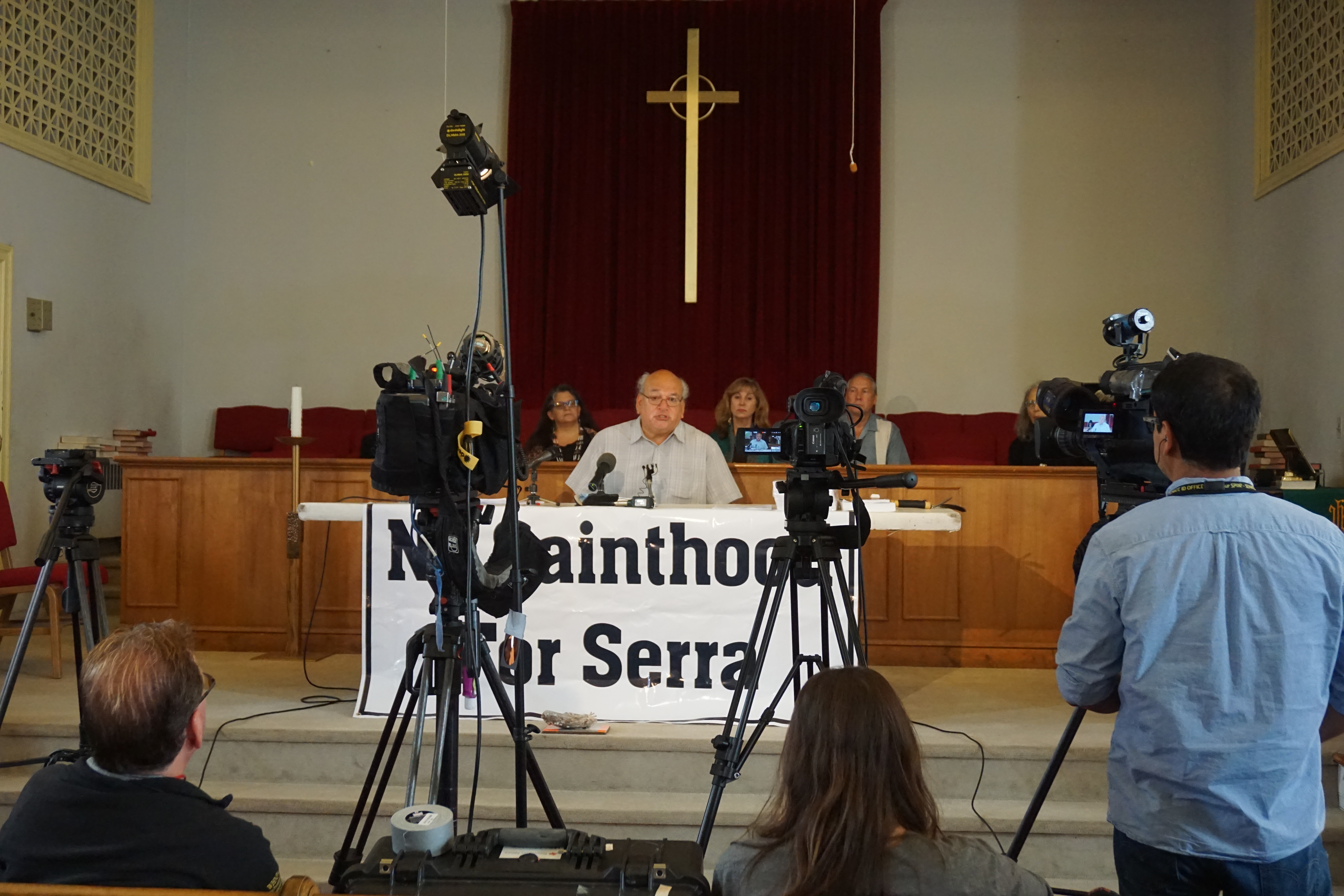
Native American activists and advocates met Tuesday, Sept. 22, in Washington, D.C., for one last-ditch effort to draw attention to their objection over the canonization of 18th-century Franciscan friar Junípero Serra.
In what was known as Alta California, and under Spanish rule, Serra founded a system of Catholic missions in which California Indians were forced to live and made to become Christian. California Indians now argue that Serra helped destroy their culture and decimate their people.
Today, on the second day of his historic trip to the U.S., Pope Francis will officially make Serra a saint at a Mass celebrated at the National Shrine of the Immaculate Conception. The Tuesday anti-canonization press conference was held a short distance away, at Plymouth Congregational United Church of Christ in northeast Washington.
Speaking at the press conference, Valentin Lopez, chairman of the Amah Mutsun Tribal Band, said that "the missions were brutal on Native Americans."
"Fr. Serra was the one who developed the mission system," Lopez said. It was his "intent to destroy the culture of the Native Americans."
By going through with Serra's sainthood, Lopez said that Francis has "opened the door to the church's dark and tragic history of its dealing with California Indians."
He said that his tribe has written four letters to the pope, dating back to 2013, but that Francis has "ignored our letters."
Other tribes — 55 in total — have also written letters to the pope in opposition of the canonization, and an online petition with more than 10,000 signatures has been collected, Lopez said.
Deborah Miranda, a noted Native American writer and poet and professor of English at Washington and Lee University in Lexington, Va., accused Francis of "refusing to listen."
"For all of his seemingly progressive, compassionate words, Pope Francis has not made one public comment in reference to our people," said Miranda, a member of the Ohlone-Costanoan Esselen Nation of the Greater Monterey Bay Area in California. "It is as if we, the very people upon whom Serra's heroic record of evangelization was built, are no more alive to Francis than adobe bricks. It is as if we, the very people whose lives and deaths made the Serra the priest into Serra the saint, are inconsequential."
Anthropologist Christine Grabowski, who specializes in Native American issues, said there is a "yawning disconnect between what Pope Francis says about the poor and what he is actually doing to Indians in the United States."
"To the church," she said, "native lives didn't matter in the 18th century, and apparently they don't matter today."
One member of the panel, a psychiatrist named Donna Schindler who has been serving indigenous populations for more than two decades, said she left the Catholic faith over the impending canonization of Serra.
"As a lifetime Catholic, I have left the church because canonizing Serra will cause an enormous re-wounding of California mission descendants, who have never healed from their initial trauma," she said.
Schindler mentioned the high rates of depression, suicide, poverty, imprisonment and diabetes that continue to affect California Indians and other Native Americans.
"When a generation suffers collective trauma, if it is not talked about and allowed to heal, the trauma is passed down to the next generation, and the next generation, and the next generation," she said. "That is exactly why making Junípero Serra a saint is so wrong. Healing the soul wound is very difficult, it becomes nearly impossible, when the truth is not told."
She added, "Acknowledging the serious wrongs done in the past will help the soul wound not only of the oppressed, but of the oppressor as well.”
Native American activist Steven Newcomb (Shawnee, Lenape), co-founder and co-director of the Indigenous Law Institute, drew a connection between Serra's actions in Alta California and the "Doctrine of Discovery," an international norm with roots in papal bulls from the 15th century that was used to okay the domination of native people in the Americas. Earlier this month NCR ran a six-part series on the Doctrine of Discovery.
"Serra's work to subject and reduce the original nations of Alta California resulted in apocalypse and annihilation," Newcomb said. The friar’s life is "best understood in the context of the documents of domination and dehumanization issued through the Holy See by Pope Alexander VI in 1493."
Famed Native American advocate Suzan Shown Harjo echoed the sentiment in a letter that was read aloud during the press conference.
"These Papal Bulls and the Doctrine of Discovery have sanctioned land thefts and dehumanization of Native Peoples from the 15th Century to the present time," the letter read. "Father Serra embodied the Catholic Church's institutional disrespect for Native Peoples' religions, sovereignty, families, languages, laws, treaties, boundaries, ways and lives, and should not be elevated to sainthood for his actions."
"We entreat Pope Francis to rescind the anti-Indian Papal Bulls and Doctrine of Discovery, and to reverse the canonization of Father Junipero Serra," Harjo's letter read.
[Vinnie Rotondaro is NCR national correspondent. His email address is vrotondaro@ncronline.org.]
